September-October 2000
A Miracle For Donnie Part III
By Donnie Lama

We continued the story of the arrest and imprisoned in Saudi Arabia of Donnie Lama for leading a Liturgy of the Word – with communion – for his fellow Catholics.
Finally, the court, the court summoned me. The judge confronted me with my admission that I preached as a Christian for 15 years. It said so in the paper. I placed my thumb mark on. On this basis, the court sent me to the Malaz Jail. To me, it was an improvement compared to the isolation cell where I was confined for the previous weeks. It was bigger and I could accept visitors. I was now in the national prison of Saudi Arabia. I found myself welcomed by several prisoners – Christian and Muslim. Most of them were Filipinos. The Filipino prisoners at the time were estimate to be at least a hundred. On the way to prison, I was submitting myself to the Lord: “Lord, help me to accept your will and your purposes for me, I entrust myself to you. Take care of my family for me. I cannot do anything anymore. I don’t know what will happen next. But I know that you will be with me.” Prison life was a miracle in itself for me. Surviving each day was grace enough from the Lord.
I Deny my Faith and I’m Free
Very early on, I was tempted to give up my Christian faith in exchange for freedom. Some Filipinos who had converted to the Muslim faith challenged me to do the same. My punishment would be lessened, they said, and I would be set free in no time at all; no questions asked. If not, I may die in prison, but it is not that easy to give up your own faith, I argued. I immediately recognized the devils voice as the proposal was being broached to me. “You’re stubborn! We are telling you the strategy and yet you persist in your religious crusade. You cannot eat religion!” I countered. “If you say that is the fastest way to freedom why are you still here? Should you not have been released? Didn’t you give up your Christian faith for Islam?” the argument stopped there. I had just proven my point.
Freedom within the Prison Walls
I was strictly prohibited from talking with fellow prisoners – Christians and Muslim alike, Filipinos or otherwise. They saw me as a threat to Islam. I found myself ministering to fellow prisoners especially to those who have lost hope and courage to go with life. I and a Filipino brother in the Lord would pray together in our native tongue so that other would think we were just talking. We also synchronized our prayer time when the Muslims were also praying. This gave us some kind of ‘freedom’ to pray everyday and have special fellowship with our God who is able to accompany us at all times.
The Truth Finds its way
The Bible was able to enter the tightly guarded prison doors. One Christian visitor of mine tested the water. The first time, I requested the prison guard to slip in paper Riyals (Saudi money) to be given to me. The money was carefully and thinly rolled to make it inconspicuous to the striker guards. It was not ordinarily allowed to give money to prisoners. But his guard was kind enough do it. The next time, my supply of money came again for the same visitor. This time, however, there was a page of Bible rolled inside it.
Psalm 91 in written form had entered the thick walls and personally delivered by a prison guard! The next time the roll of money became a little thicker. When I received it from the guard, there were 5 pages of the Bible in it. The next time, there were 20 rolled pages. After several visits from the Christian visitor, we were able to gather a good portion of the Bible, both the Old and the New Testament! There was rejoicing among us Christian prisoners – for it would mean food for our hungry souls. It was also a clear demonstration of God sovereignty and power over tightly closed doors and thick walls. He enters us and no one can stop Him. Life and through simply find a way.
How we guarded the Pearl of Great Price
With the Bible we received on installment basis, would read the Word to my fellow prisoners specifically the Filipino community. Then I would expound on it and then pray. We did this while the Muslims were having their prayer time. The Bible was kept in the custody of one of my prison mates, tightly guarded. It is to us pure gold, a treasured possession. How the Bible was being hidden by us Christians inside the prison doors was another interesting story. (Editor felt it safer not to print this story)

Signed, Sealed, and Delivered
I had devised my own communication system to the outside world. I would collect plastic straws which I use in drinking softdrink given to me by my visitors. Behind the prying eyes of prison guards and cellmates, I would roll my letters very thinly then insert them in the straws. I would then insert he straw in a tiny whole I discovered in a wall of the prison where opposite of that wall was a waiting area for visitors of prisoners. Trusted friend who visited me would know what to do once they saw a straw protruding on their side of the wall. One would be on the look out for guards while the others would pull out from the straw a thin strip of rolled paper. This was how I sent my first letter to my wife a month after I was imprisoned to let her know of my situation.
Betrayal
I also experienced how it was to be betrayed. There were co-prisoners who tipped off the prison warden whom they call Mayor. They would send word to the warden that two other prisoners and I were preaching Christianity inside the prison. This resulted to my being punished by bringing me in the isolation cell together with the two other prisoners, Roger, Pascascio and late Ruel Janda, each time the warden was tipped off. We did not mind being put in the isolation cell despite the fact that here we were a lot less comfortable to sleep, less space for us to move about, less air to breathe, less light to see, less people to talk to. Roger, Ruel and I occupied an isolation cell that faced a wide circular and solid wall, which was built at the center of the prison where prisoners were tied and whipped as part of their sentence. Every time prisoners were bought in that circular wall, I would see with my own eyes and experience in my life the words of the Psalmist, “A thousand may fall at your side, ten thousand at your right hand; but it will not come near your. You will only look with your eyes and see the recompense of the wicked.”
I endured the harshness of he isolation cell. Until one day, a Saudi prisoner was brought into the same cell. He was in his early 30’s. He was imprisoned for killing his brother. He turned out to be a very violent man and very mentally sick. If the intention of the prison guard was to torture us, a mad man for a prison mate was very effective. I and my Filipino companions had no peace and quite once the mad man joined us in the cell. We never slept a single night for fear of being strangle to death. We would always be half-awake and alert to protect ourselves wherever the mad man turned violent. He would throw his food at us. He would spit at us. He would pee on the floor and scatter his feces on the wall.
The three of us realized that whatever happened to the mad man, we stand to lose. If the mad man died for whatever reason while he was with us, his death shall automatically be cast upon the three of us. The other possibility was we die first for the physical and mental abuse we were receiving from him day in and day out. Roger, Ruel and I felt we were living with a very hungry, very angry roaring lion that was ready to eat us alive anytime he wanted to. We had already petitioned the prison guards that we be separated from the mad even if it meant the three of us being tied to a single post as long as it is outside the cell and away from the lunatic. But the guards would not listen to us. I found myself crying all over again for the hopelessness of our situation. Perhaps because I was so tired after several sleepless and restless nights. I was encouraged this time by Ruel. “Take heart, Donnie,” he said. “We cannot do anything but pray that the Lord will give us peace and rest in our hearts and save us from this crazy man.” We all cried to God for help that the mad man be taken away from us. I recited Psalm 91 and sought refuge in His word: “You will tread on the lion and the adder, the young lion and the serpent you will trample under foot, because he cleaves to me in love, I will deliver him; I will protect him, because he knows my name. When he calls to me, I will answer him and honor him...”
I Was Ready for Anything
For three days, we were able to rest because the guards transferred the mad to another cell. But after that, they brought him back to us. This time, however, my companions and I had learned to be more secure in God’s protective care. As to the mad man, he became the lion in Daniel's den. He simply closed his mouth. Finally, the three of us were able to return to the big cell. But he warden warned me: “Don’t do anything foolish again like the preaching that you do. Or else, it will be the isolation cell again for you and it would be a severe and ultimate punishment for you.” In my heart, however the suffering I had done through had made me stronger. I was more convinced than ever that no matter what happens, I would stand up for Jesus, even until death. I was ready for anything. I was happy to be serving the Lord in this way. After all, I was secure in the lord. I was also certain that my family is in God’s very capable and loving hands. If there was anything that prison life did to me, it was to deepen my conviction that the lord is good and He is worthy to be served.
Very early on, I was tempted to give up my Christian faith in exchange for freedom. Some Filipinos who had converted to the Muslim faith challenged me to do the same.
To be continued... next issue will tell you of Donnie extraordinary exit from prison.
Bloom Where You Are
The radical theology of Therese of Lisieux
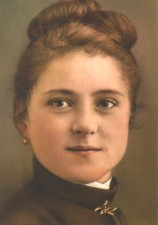 By Ma. Ceres Doyo
By Ma. Ceres Doyo
Through her pen the world learned about the story of her soul and her wondrous journey into deep intimacy with God. She did not have a huge following when she was alive for she lived in obscurity in a Carmelite monastery. She did not leave behind large missionary foundations. But through her writing that were made public after she died at the age of 24 in 1897, people got to know her and were amazed at the depth of her spirituality.
Saint Therese of the Child Jesus and the Holy Face, popularly known as Saint Therese of Lisieux or the Little Flower, has arrived in the country. Most Filipinos know her as Santa Teresita. Her relics arrived for a three-month journey across the Philippines and some parts of Asia. The veneration of relics of saints is not idolatry. According to a primer on St. Therese relics, “The veneration must be seen in the way men and women of all ages and cultures venerate the dead and pray in front of her mortal remains. The relics of the saints, meditations of their presence and memorials of their historical existence evoke their humanity – the way they lived, worked, suffered and prayed. Through their relics, God manifest His presence and shows forth His might and glory.” Bishop Ramon Arguelles, Military Vicar and Chair of the millennium Saint Foundation, says that in welcoming Therese’s relics, and her little way of confidence and love, the Church welcomes God’s merciful love. He quotes the Bible, saying: “And a little Child shall lead us.”
Declared by the Catholic Church as the Millennium Saints, Therese was a contemplative who never left the convent during the nine years that she was a nun. Nevertheless, she has been named Patroness of the Missions, side by side the Jesuit missionary Saint Francis Xavier whose incorrupt remains now rest in Goa, India. Although she was not a scholar, Therese (pronounced tey-rez in French) was proclaimed in 1997 the 33rd and youngest Doctor of the Church. She is along with warrior-saint Joan of Arc, co-patroness of France.
 Therese’s written work reveals her to be sugar and steel. A precocious young woman endowed with spiritual gifts and who used them to propel others to great heights. It was through her pen that she shared the workings of God in her young soul. She did not produce huge volumes, just three manuscripts about her life, from childhood until her last days, which was really at first, a family journal and later an account of her spiritual journey, plus some poems. And she wrote only because she had been made to under the rule of obedience.
Therese’s written work reveals her to be sugar and steel. A precocious young woman endowed with spiritual gifts and who used them to propel others to great heights. It was through her pen that she shared the workings of God in her young soul. She did not produce huge volumes, just three manuscripts about her life, from childhood until her last days, which was really at first, a family journal and later an account of her spiritual journey, plus some poems. And she wrote only because she had been made to under the rule of obedience.
Little Way
The essence of Therese’s life and message was spiritual childhood, “the little way”. Born Marie Francoise Therese Martin on January 2, 1873 in Alencon, Normandy, France, she was the youngest of nine children. Her mother died when she was four and it was her father and older sisters who brought her up and doted on her. A headstrong child, she had a bout with a mysterious illness when she was young. The Martin family later moved to Lisieux where Therese was educated by Benedictine nuns. Three of her sisters became Carmelite in Lisieux and another a Visitation nun, Therese entered Carmel in 1888 at the young age of 15 but only after getting a papal dispensation. She made her profession in 1890 and later became mistress of novices.
A Special Soul in their Midst
In 1895 she was made to write the sorry of her soul (Manuscript A and B) by the prioress Mother Agnes who was her own sister (Pauline), and later Manuscript C by another prioress, Mother Marie de Gonzague. Her superior knew that a special soul lived in their midst. But Therese was not a glum, brooding personality. Her novice mistress described her thus: “Tall and robust, childlike, with a tone of voice and expression to match hiding the wisdom, perfection and discernment of a 50-year-old. She is always calm and in perfect possession of herself in all things and with everyone. An innocent little one but her head is full of tricks. A mystic, comic, everything – she knows how to make you weep with devotion or just as easily split your sides with laughter.
Dark Night
During the Holy Week of 1896, Therese discovered she was ill with tuberculosis. This was to be the start of her “dark night” but she continued writing. Therese died in 1897 and was buried in the Lisieux town cemetery where her body lay for many years. Contents of Therese’s notebooks were circulated after she died but only among circle of friends. Little did her sisters know that hey would create a stir and later, “a storm of glory.”
The first manuscripts were published in 1898. They were heavily edited to conform with contemporary style. When Therese’s fame grew, there was a clamor for them ore spontaneous originals. They were published as such upon instruction form the Holy See. The complete, unabridged The Story of a Soul (L’Historie d’ une Ame) as Therese wrote it, became bestseller.
Therese was beatified in 1923 and canonized in 1925 by Pope Pius XI who called her “the star of my pontificate.” Therese’s vision went beyond the monastery walls. She wanted to reach out, “to be a missionary, to proclaim the Gospel on all the five continents.” While in the monastery she corresponded with a young man studying to be a priest. Priests were always the object of her prayers.
Grasping Essence
Many books and scholarly articles have been written about Therese but it is only by reading her simple and original work that one could grasp the essence of the spiritual way that she lived. A sampler: ‘Your love, Jesus, is an ocean with no shore to bound it; and if I plunge into it, I carry with me all the possessions I have. You know, Lord, what those possessions are- the souls you have see in fit to link with mine; nothing else.”
In 1986 a French film based on her life was made, Starring Catherine Mouchet and directed by Alain Cavalier, the film has been positively reviewed as “enormously evocative and powerful.”
Beyond Sweetness
Therese continued writing until her death. And although her writing style could be considered too saccharine, one should be able to see beyond the sweetness. She used a lot of Biblical references and her writings were found to be theologically sound when seen in the context of contemporary theology.
Therese was very much in love and that love was tested during her “dark night”. Her dying words: “I do not die, I enter into life.” The passion and the fire did not dim when the hour of reckoning came. She blazed. She soured.
A Strange Story
By Sr. Amalia Perez ocd
Msgr, James McCloskey, Bishop of Jaro, Iloilo, had an important mission to undertake that picturesque day in 1920 in Lisieux France. As Bishop of Jaro, Iloilo, he was there to request the Mother Patroness of Carmel of Lisieux to help him found a convent of Discalced Carmelite nuns in the Philippines. Having arrived too early for his appointment with Mother Prioress, he found he had time to visit the relics of Therese in the convent’s souvenir room and to pray. When a young nun arrived to give him a tour of the souvenir room, he found himself telling her of his desire to bring Carmel to the Philippines. The nun assured him that Therese of Lisieux would help him and left.
In a while, Msgr. McCloskey was able to see the Mother Prioress, Sr. Agnes of Jesus, who was no other than Marie Pauline, one of the four surviving sister of Therese at that time. Then the Bishop thanked her for having sent the nun to be his tour guide, she expressed some amazement and explained that she had not sent anyone. When the Bishop described the nun, he Mother Prioress exclaimed, “Your Excellency, you have just seen my sister, Therese!”
On November 8, 1923, Mother Teresa of Jesus, Sub-prioress of Carmel of Hue in Annam (now Vietnam). Arrived in Iloilo as Prioress of the new foundation. What Bishop McCloskey loved to point out thereafter was the fact that Carmel of Hue was founded by Carmel of Hanoi, which had been founded by Carmel of Saigon which, if matters are to be traced to the very beginning had been founded by Carmelite nuns from Lisieux in 1861, which is why Carmel in the Philippines traces its origin to Carmel of Lisieux.
St. Therese is known as “the greatest saint” of modern time” because of her Little Way which she explained during one of her last conversations with the Mother Prioress, her own sister, Mother Agnes. “One hope alone,” St. Therese said “makes my heart beat fast. That is the love I shall receive and the love I shall be able to give! I feel that my mission is soon to begin to make others love God as I love Him. To teach souls my Little Way, I will spend my heaven in doing good on earth!”
This is not impossible,” she continued, “for the angels keep watch over us while they enjoy the beatific vision. No, there cannot be any rest for me untilt he end of the world – till the Angel shall have said. Time is no more because the number of the elect will be complete.”
Dare To Dream
By Gloria Canama, Columban Lay Missionary
In Pakistan women are second class citizens in culture, in law, in religion and in many small details of daily life. As a result they have a low self-esteem. Gloria Canama tells us how simple Bible sharing helps build up Pakistani women’s self-worth.
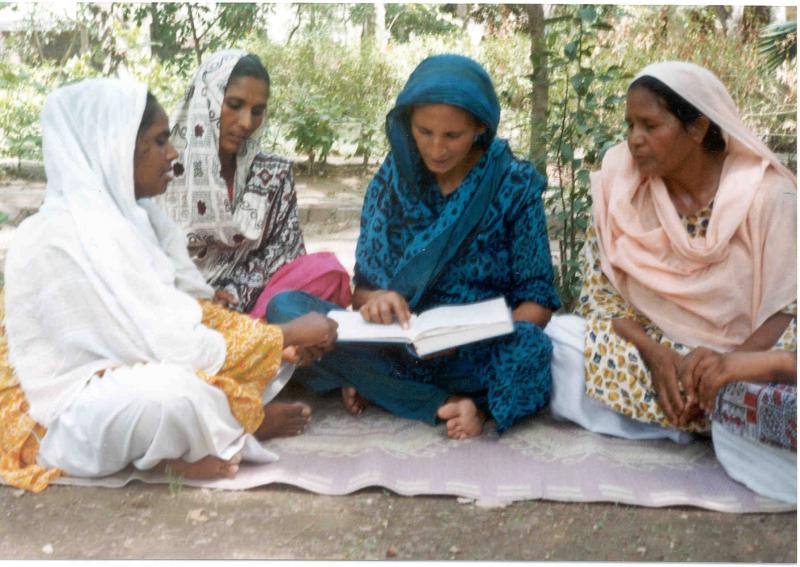
There’s a time for everything. There’s time for planting and a time for harvesting. There’s a time for hello and a time for good bye... after many years in Sheikhupura, Pakistan, the time has finally come for me to say goodbye. I’ve never got used to the pain of saying goodbye. Part of my introvert self just wanted to pack my things and leave quietly. But of course it wouldn’t be right especially to these women I have been working with. Most of them can hardly read and write but they do know how to survive in very little situations. In the beginning, they seemed resigned to their fate or more aptly to what they’d been told to be and do. These women are made to believe that they are nothing, even burden. They themselves have experienced the grief and anger when a girl child is born. They have seen the jubilation of the whole community when a boy child is born.
Dare to Dream
Fortunately, a few of these women dare to dream, to take the first few steps of awakening, of naming, of owning and of believing in their own stories. This was sparked through a Bible sharing.
Sheda
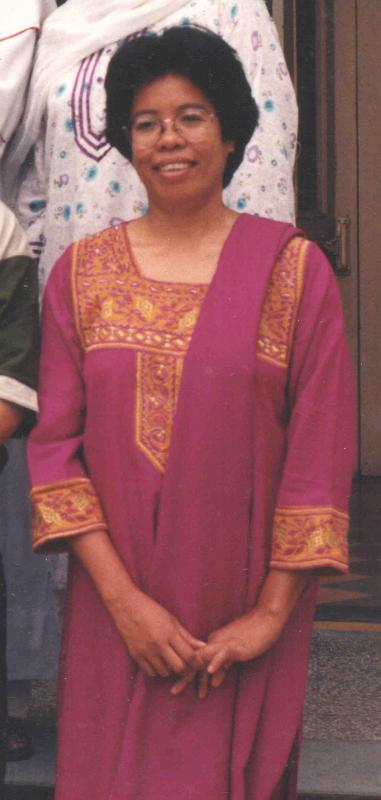
In one of our bible sharings we read twice Matthew 5:14-16, “You are the light of the world...” with few moments of silence in between. Then each one was asked to hold the lighted candle and say for everyone to hear, “I am the light of the world. I will let my light shine before others.” Reflection and sharing followed. Sheda, almost in tears, spoke first. She was overwhelmed with the truth that she herself had just spoken. “I am the light of the world. It seemed unbelievable that God loves and trusts me, a woman – poor and illiterate – to be the bearer of God’s light. I have heard this verse many times. And I was conditioned to believe those words were for others, in particular for men. It never dawned on me before that Jesus has meant those words personally for me!” when she reflected at her own life at home and community, she has grown in conviction that has indeed been called to be he light of the world. All the other women in the group identified with Sheda’s insight. They too had long believed of their unworthiness. Not anymore. Now, they’ve chosen to believe and share their light. One concrete way is through education for themselves and their children, girls and boy alike.
Presently, Sheda continues to attend parish meetings and other activities, wasting no time in sharing whatever she has learned at home and at work. She doesn’t know much reading and writing but this doesn’t prevent her from sharing God’s message be it in their community prayer or in her workplace. She knows most of the Bible stories of Naomi and Ruth of Martha and Mary. Sheda and the other women have responded to God’s call to be the light of the world with faithfulness, pride and commitment.
Margaret
Margaret was the youngest mother in the group, She was filled with wonder at the birth of her son. She looked very fragile yet the child was strong and healthy. She couldn’t believe he was coming from within her and was there for nine months. He’s now having a new life of his own and she’s now a mother. For Margaret, giving birth and motherhood relives Jesus’ words, “Unless a grain of wheat falls into the earth and dies, it remains alone; but if it dies, it produces much fruit.” When Margaret held her child for the first time, she had forgotten all the pain and exclaimed, “This is my body, this is my blood.” Deep in silence in reverence to their motherhood, God’s greatest gift to women, letting them share His work as Creator and Life-giver.
These women haven’t studied or read books on theology or feminism. They have asked questions from their own life experiences and from their coming together to pray, reflect and share their stories. It was unimaginable before for a woman to stand in front of the whole community and share her thoughts. They seldom went out except to work. They have often used and come to believe the slogan, “Educate a mother and you educate the whole family”. Many women have certainly grown in self-confidence, in believing in their unique giftedness, wisdom and strength. A number of women in the parish are now Bible leaders already, animators of family life and women’s programs. They are also aware of the continuing hardships as women in a still male-dominated culture.
Goodbye in Harvest Time
Time to say goodbye to my garden, we have gathered the harvest of those planted not only by us but also by many others. We have also gathered seeds for another planting season with hope for a more bountiful harvest in the future. The goodbye turned out to be a feast, a joyful celebration of the harvest of our shared journey. However, it was hard letting go. Plants and flowers became special and dear to me. I tended, watered and even watched them grow all through different seasons. They gave me energy, joy and have given me wisdom in life. I was in tears when I left the Philippines for Pakistan. I was still in tears when I left Pakistan. I was still in tears of the pain of goodbye but they were also tears of joy and gratitude.
From The Jaws Of Death
By Baby Hofileña
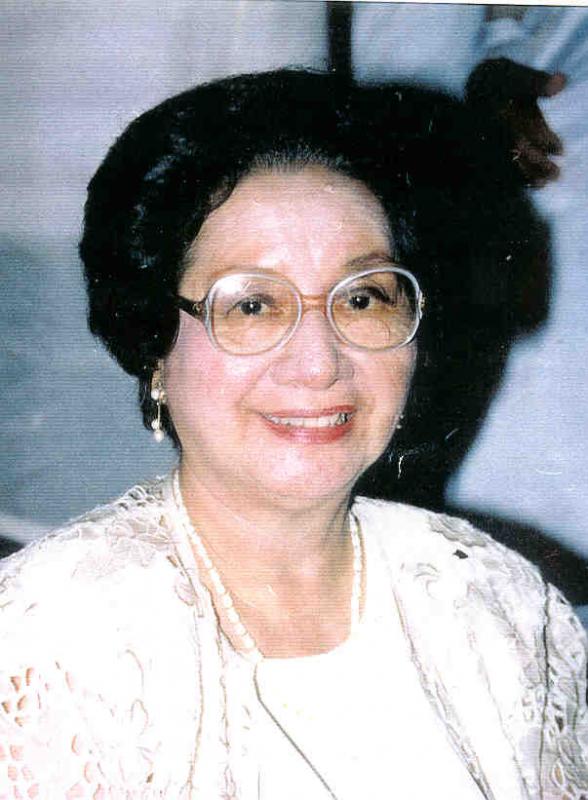 When Baby Hofileña shared some of her ‘journey’ a few issues back, she never mentioned that she is a member of the Focolare Movement. The Focolare Movement does not preach very loudly in words but it does affects the lives of the members so I asked Baby to tell us something about this hidden but powerful movement which is having such an effect throughout the world. (Ed.)
When Baby Hofileña shared some of her ‘journey’ a few issues back, she never mentioned that she is a member of the Focolare Movement. The Focolare Movement does not preach very loudly in words but it does affects the lives of the members so I asked Baby to tell us something about this hidden but powerful movement which is having such an effect throughout the world. (Ed.)
I am Baby, 71 years old, and my husband, Cris, is 76. In the January-February 2000 issue of Misyon, Fr. Niall O’ Brien published an article of mine entitled, The Best Time is Now. It showed how one’s wrong attitudes and behavior, with God’s grace, can gradually be turned around into seeking His will and discovering His love. I owe this to many graces but in a special way to the Focolare Movement which I came to in midlife.
I went to the ‘City of Mary’
Focolare came to the Philippines in 1966 and Tagaytay has become the seat of the Movement is Asia. I first met the Movement in 1976 when two Focolarinos came to Bacolod from Manila and gave a little morning talk in a Catholic college in Binalbagan, a town south of Bacolod in Negros Occidental. They did not say anything much other what I already knew, I thought. But their simplicity in sharing how they were living the Gospel concretely was what struck me. They invited us to attend a Focolare three-day summer gathering called Mariapolis (City of Mary). I went.
That’s when I heard about Chiara Lubich and her special spiritual way centered on the gospels a way of life. And it was that way of life that helped me through the various crises which befell me about ten years ago. Once the children were safely on their way – more or less – life became a bit more tranquil till I came up against a serious health problem – my heart. Then followed a series of heart attacks which had a special significance. That was when the spirituality of Focolare meant so much to me.
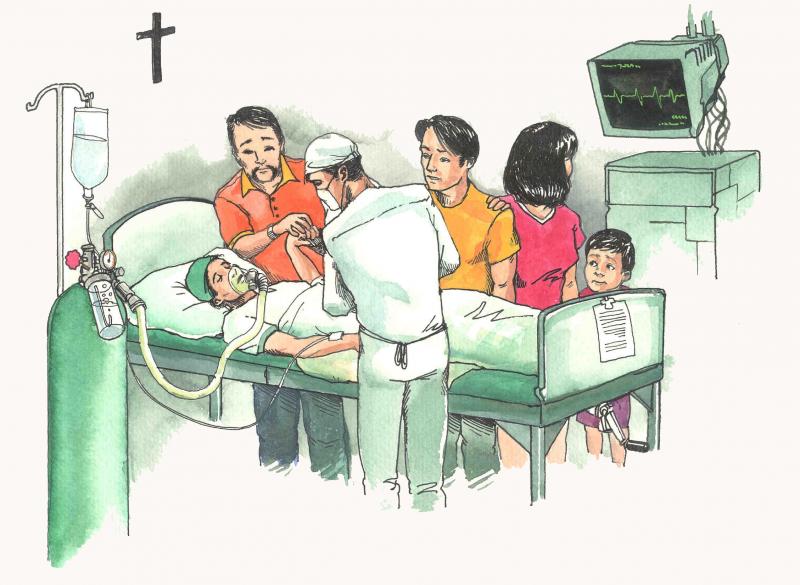
Heart Attack
October 28, 1991 I had a myocardial heart attack followed by a potassium collapse four months later. What did not happen at the hospital happened at home about two months afterwards when I had my third and most serious heart attack again – dawn of Easter Sunday 1992. It was a fibrillation cardiac arrest and I was asleep when it happened. Luckily my husband heard me making unnatural sounds and I was brought to the hospital before the point to no return. But the resident physicians couldn’t revive me. They called my personal doctor Susan Logronio and informed her that I seemed ‘gone’. Good thing she lived just nearby and after telling them not to give up trying, she was beside me in no time, in coat dress and slippers only. Dr. Ernesto Namin – another personal Doctor – arrived a few more minutes later and together they ‘butchered’ me – as my daughter-in-law would describe it – cutting through main thigh arteries, gory blood and all, without anesthesia (no time and no need for it anyway) to let it tubes that would bring medicine direct to the heart. I couldn’t care less as I was dead out.
Happy Easter!
My heart started to beat again after all that and six electric shocks and as I emerged it was early dawn of Easter Sunday! The whole period for me was almost literally like a sharing in Christ’s Passion and Resurrection, I was in blissful coma for three days not knowing that Dr. Namin had been preparing the family for the worst, himself not knowing if or when I would come out of it and, if I should, what my condition would be. However I did come out of it on the fourth day but I was oblivious to everything around me. in short, for another week, I was in a state of amnesia.
Letter from Focolare
A short letter to time from Cebu Focolare – the word means fireplace in Italian – reap simply, “We entrust you to God. Embrace Jesus forsaken.” It was enough. Scripture says, “All things work out for good to those who love the Lord.” Perhaps it does also work out for those who want and try their best to. For me all these turned out to be a blessing. I was spared from experiencing and remembering any trauma or discomfort during those critical days. Slowly as my faculties returned, they were all normal as if nothing happened.
Everyday can be Easter
No one can fathom the mystery, the wonder and the beauty that God works in and around us when we put ourselves in His hands trusting Him like a child completely dependent on his father. It had helped me so much to be relaxed and even cheerful in moments of great suffering. A slow recovery and convalescence followed. Easter Sunday will always have a special meaning for me – a rebirth both physical and spiritual. I realized that each time I die to myself, my ego, my pride, my selfishness, and even my ideas for love and unity with my neighbor, I overcome death; I rise and live again with the Risen Lord. Everyday can and should be Easter for us all.
What can I say about all these wonders that God has done for me? No one can deserve such love. Those who know me would say that I still have a mission to do. I laughingly told Fr. O’B that he is making that possible by putting my story in Misyon. To think that I am just here in my little place but able to reach thousands of readers, even across oceans.
Home At Last
By Sr. Marie Madeline ocd
Some years ago the Carmelites of the Philippines decided to send a missionary team to Ghana, Africa, carrying on them missionary spirit of St. Therese as their response to the Pope’s call in 1981 when he visited the Philippines that more Filipino Catholics serve in Africa. In 1998, after a year’s preparation in which they lived together as a community, a group of young sisters set out for the long journey to Africa along with her mother superior, Sister Marie Madeline. Luckily they had a guardian angel, Father Charles, and many other angels on their way. Here is an extract from Sr. Madeline story of how she accompanied this new group of contemplative nuns bravely setting out for Africa at a time when Africa, contorted with war and famine, is no picnic. We apologize for cutting down Sisters beautiful article in which she thanked so many people but space only allows us the following. One their way to Africa they stopped in Rome and actually met the Holy Father and got a special blessing from him. From Rome the Sisters set off for Africa. (Ed)
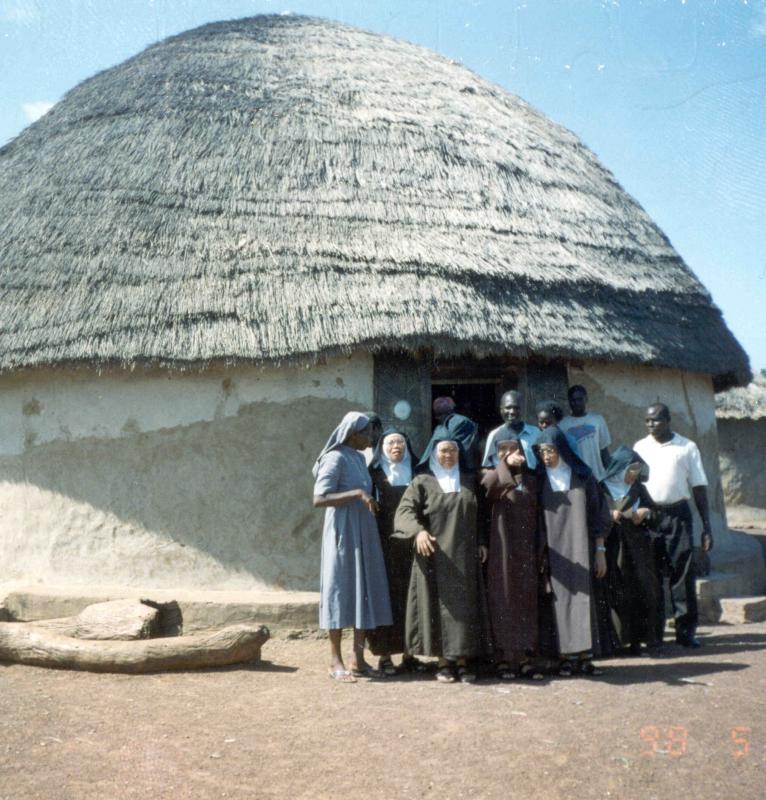
Our Alitalia flight left Rome promptly at 2:30 pm and after 8 hours or so we landed in Accra, the capital of Ghana. It was 8 o’clock in the evening and the air was hot and humid. After a week of ‘first-world’ life in the cool and comfort of Rome, we were coming to another world. Amidst the jostling and the shouting as black African bodied crowded around us to help wit hour luggage, we found refuge in the welcoming arms of Filipino Friends who came to meet us. They were with Fr. Christopher Bazaanahm, the Vicar General of Tamale Archdiocese, who had a mini-bus ready for us.
Arriving ‘Home’
Monday, May 4, was a whole day of travel-from 5:30 am to 7:00pm- from Accra all the way up, up, up to Tamale, by mini-bus which was a far cry for Our Holy Mother’s carriages but still as open to adventures and the exclamations of cloistered nuns going to a new land. As the road moved north, the weather got drier and hotter, the surrounding country side less green and the land more flat. It was dark when we reach Tamale but our heats lighted up when we met the Archbishop, Most Rev. Gregory Kpiebaya, who was waiting for us in his residence with an African meal ready for tired and hungry travelers. His tall, dark welcoming figure with the eagerness in his voice and his big warm smile was more than enough to soothe our aching bones. Yes, we were home indeed! And that evening we did reach home – a newly renovated and painted bungalow in Nim Avenue (about two blocks away from the Cathedral) with 8 cells, a refectory and kitchen, 2 bathrooms and toilets, a veranda, a small chapel in a separate building, 2 water tanks and the whole property of bout 1/3 hectare was surrounded by a seven-foot-high-wall. Each cell has a bed, a desk and a chair, a cabinet and a ceiling fan! Everything just seemed perfect and every nook and corner drew cries of delight from the Sisters. “Lord, it is good for us to be here!” it was almost midnight when we retired – dead tired but deeply grateful to be ‘home’ at last.
The night it rained! A precious gift from heaven for sub-Saharan Africa. One of the missionary priests said, “Our people will always remember that the day the Carmelite arrived, it rained.”
Left by our Good Shepherd
Our Carmelite companion who had now only two days left with us. This time was put into full use: a serious 3-hours session with the Archbishop to clarify and settle the contract between the order and the Archdiocese regarding this mission-foundation, our first Mass concelebrated with the Archbishop and followed by the blessing of the house, a visit to the 10-acre land in Tempe-kukuo where the monastery will eventually be built, and a visit to Archbishop Emeritus Peter Dery who had originally asked for this foundations. Fr. Charles gave his time making contacts with other priests and religious to whom we could turn case of future needs. In the evening of Wednesday, May 6th, he bid us goodbye, as he had to leave early the next day for the long trip back to Accra and then on to Rome. Our hearts went with him and we felt like orphans for he had been our good shepherd for these early beginnings, but we knew he also left his heart with us and we could always count on his support and prayers.
Now We’re on Our Own
Sisters took turns for the cooking each day. Some Sisters learned to do the marketing, at first with the help of their Chaplain, Fr. Gregory, or an FMM Sister who offered to bring them with her regular weekly marketing and later on their own. Sr. Susan was sacristan and in-charge of all the basic things needed for our daily Eucharist. Everyone did her share for the cleaning. Sr. Ria was portress and was kept busy by the constant flow of visitors eager to meet the new arrivals, but she had Fesini, their Muslim day watchman, to open the iron gate whenever someone knocked. The sisters also began preparing garden plots and planted vegetable seeds which they had brought all the way form the Philippines as soon as it rained again. In a few days time the corn and kangkong were sprouting – signs of new life.
P.S. The eight Sisters who went to Ghana were Sisters Mary Bernard Magaro, Maureen Virtucio, Miriam Florentino, Mary Chritesa Villena, Maria Corazon Quiamboa, Maria Teresita Cadelinia, Mary Rachel Deano, Mary Susana Tamayo.
In The Land Of Monks
By Fr. Benny Enano cm
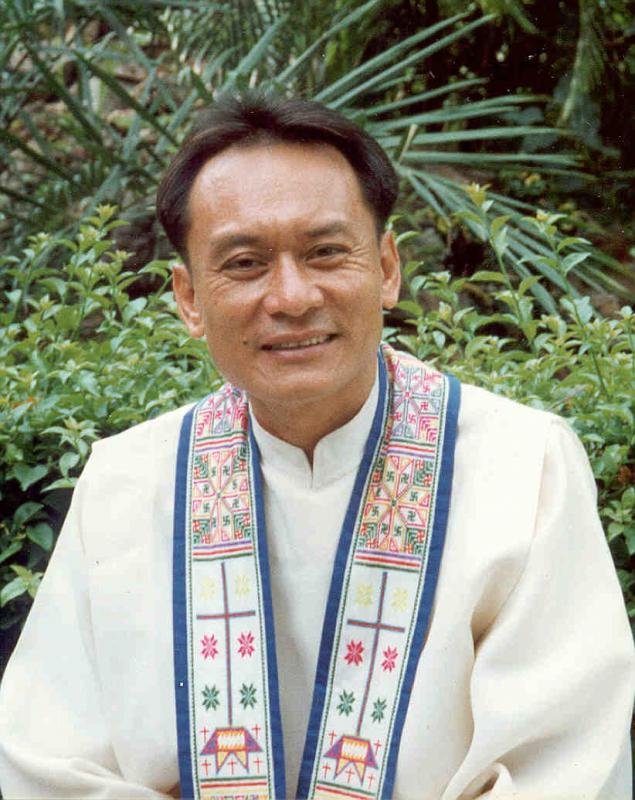
Fr. Benny Enano, a Vincentian missionary, is from Igbaras, Iloilo. He is the youngest of five children. After his ordination in June 29, 1991 he was assigned as parish priest to Our Lady of Miraculous Medal Parish, Molo. Then a few years later he was sent to Thailand for mission.
I was sent here in Thailand 5 years ago to join our two missionary priests in their mission work. Thailand is a Buddhist country where monks play a very important role in the spiritual life of the people. I studied the Thai language three hours a week in Khon Khaen University under an individual instruction for six months. But after a year I just found myself being assigned as a parish priest of Holy Saints Parish. I wasn’t prepared for the job yet. My learning of Thai was still inadequate. Thai language is very difficult. It has its own script, it is made up of many characters and one word means many things – according to the sound or tone. But then I was forced to study hard all by myself when I had to start saying the Mass in Thai. For a start, I asked one of our scholars to read the readings for the Mass in Thai while I wrote it in phonetics. This allowed me to read Thai words. Eventually I moved on to reading scriptures in Thai and at the same time learning how to write the homily in Thai. With the help of the students in the community, I was able to improve and even did the homily without anymore reading it.
First Christmas
The first time I celebrated Christmas here, I called for a meeting regarding the preparations for the celebration just like what we have normally do in the Philippines. And the first eager question was, “What can you give us for Christmas?” I asked them back, “What can we share with the community?” They said they had nothing to give. So I approached the youth if they are willing to do caroling to raise funds for the celebration. The youth agreed and so we had an enjoyable holiday. We had Mass and games for everybody. Most of the Catholics in the parish and even some Buddhists participated in the Mass.
What a Priest is
Then I initiated a piggery program to let the people know that priests need to be self-sufficient, that priest are not rich, that priests need to support of the community. This project would support the scholars of the parish. This would also encourage and teach them how to raise pigs, chickens and ducks or grow beans, corn and lemon grass. They could then sell their products.
I tapped the youth and together we initiated programs for the community such as the Summer English Camp. A Filipino teacher and two Brothers volunteered to help us. The activity succeeded because many attended the Summer Camp. The joy was seeing the students on stage performing on their graduation day, confident not Just in speaking in English but in showing off their other talents.
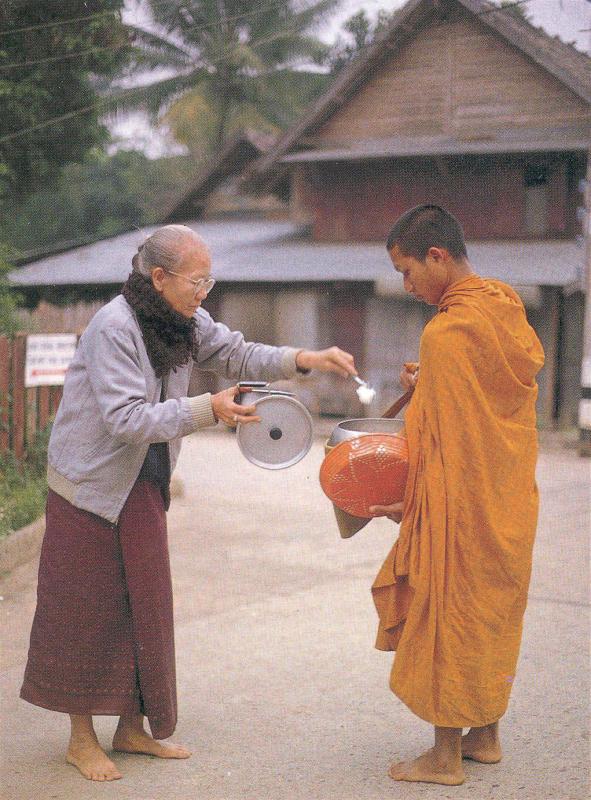
Slowly and Surely
To keep going in my mission work here in Thailand, just need to keep my patience and always remind myself to journey slowly but surely. I’m here, like most missionaries, not to impose conversion, But just to be with the people and manifest God’s love and faithfulness.
The Couples Reach Libya
By Veronica Ugates
Libya is on the north coast of Africa. At one time, a couple of thousand years ago, it was part of the Roman Empire. In fact that was where St. Augustine’s famous city of Hippo was. Today it is a Muslim country but Christians are allowed a little room for movement, quite unlike some other countries in North Africa. Veronica Ugates, together with a Filipino community there through a beautiful spiritual experience had got involved in the Couples for Christ. The Couples for Christ is an organization which tries to help husband and wife to pull together in the same direction, to bring their life in line with Christ and supports family values in the light of the Gospel. A great organization. Here you will see how it flourishes even in the deserts of far-of Libya.
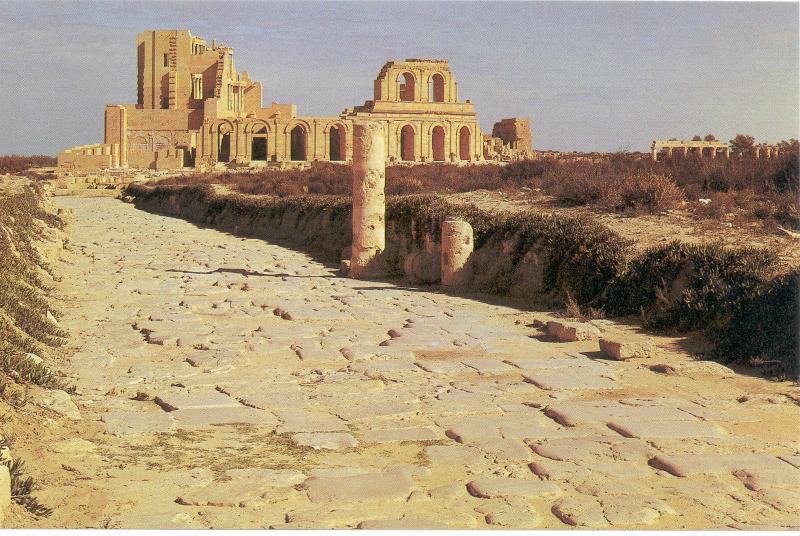
I have been working in Tripoli for the past 15 years. In all those years I have been completely indifferent to the things that were going on around me. In 1987 I met Armando, married him and the following year had my baby. My world revolved around my family’s needs. However, at the time I delivered my daughter by caesarian. I underwent an unforgettable experience. I almost died while on the operating table because I developed an aberrant reaction to the drug syntocinon.
I almost got there
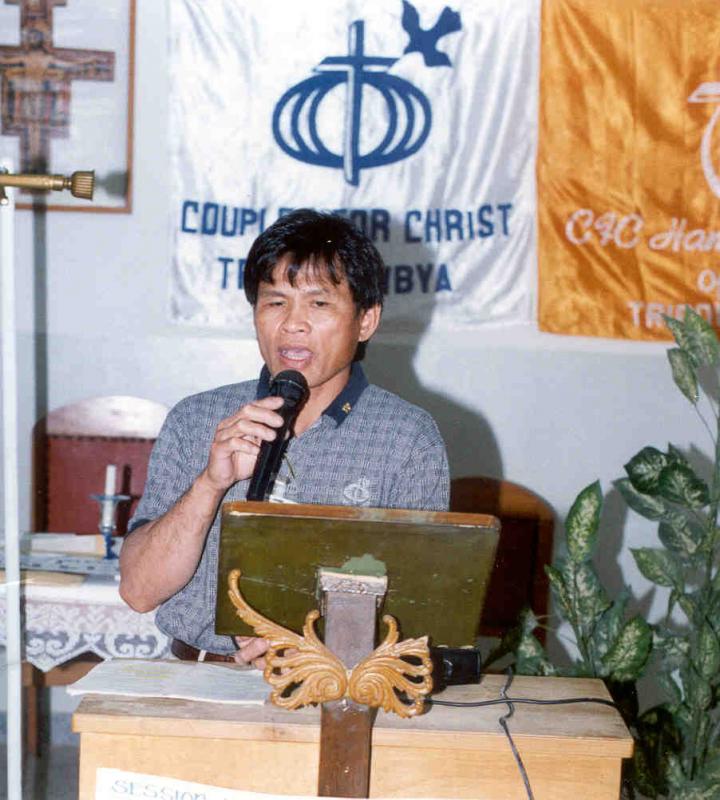
I was asleep, then Sunday I found myself looking at myself on the table. I was somewhere above the theater lights and looking downwards while the nurses and the doctor was galvanized to action because I fibrillated (an irregular convulsion of the of the muscular wall of the heart). I could her then clearly as one commented. “Why did she fibrillate? She has no history of heart problem.”
Then I went forward into a very dark tunnel and I spoke to myself, “Hanggang dito na lang pala ako. Anong magagawa ko?” but though the tunnel was very dark and I could not hear nor see anything I felt envelop by a very profound sense of peace. I felt very content. And I thought, “Hindi naman pala istrikto ang Diyos.” Because I did not think of myself as deserving of heaven and yet I felt I was going that way. Then suddenly I woke up with a terrible pain all over my body. I kept saying, “It’s painful, it painful.”
The CLP
That experience did not change me at all. I can clearly recall those moments but I thought that was only it. It was back to earthly existence. But in November 1997, a CLP (Christian Life Program) was conducted here in Tripoli to which my husband and I attended. My objective was perhaps to find some ways to ease the difficulties. I was experiencing in our marriage.
Couldn’t Say No
It was then that I met Fr. Jose Latigio, ofm. And upon hearing the experience I had had Fr. Joe told me perhaps that experience was to wake me up to the knowledge that I have not done something useful with my life so far. Fr. Joe initiated the sessions for married couples to contribute in the making of the pre-cana seminar lecture notes. There were four or five couples invited at a time. Since I worked as a medical secretary with access to a typewriter and computer, I got the job of collating the contribute materials. At the same time, we were also chosen as members of the pastoral team of Couples for Christ. So whether we liked it or not, I was not given the choice to go back to my shell.
That was two years ago. So far we have conducted several CLPs and pre-cana seminars. At the same time I was asked to form the group that composed the feature writers for the newsletter, at first with the Couples for Christ newsletter and later with the Church newsletter.
Fight for an Abused Child
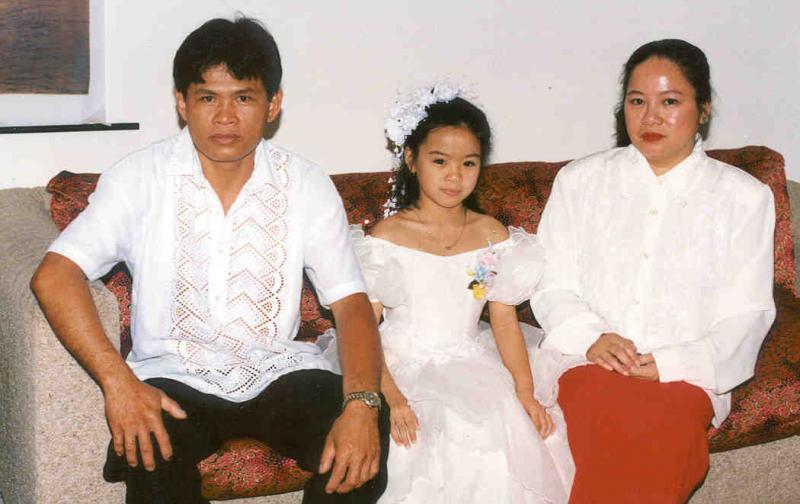
Recently we got involved in seeking justice for a sexually abused child whose case would have been cast into limbo had not some concerned Filipinos banded together to support this unfortunate mother and her daughter. This has been a tough struggle so far because a lot of people would rather not get involved. And the man who was involved has a lot of friends in the community whereas the mother is not from Tripoli and she has the disadvantage of being a single parent. I have to bear with a lot of indifference and sometimes downright hostility even from those people I thought would be more supportive.
The Hope is Up
At present the case is on trial. We still do not know the outcome. But we have not lost our hope that justice can be achieved. We only hope that the witness will not give way because the opposite camp is trying to intimidate her.
Thanks to the Almighty, we are able to extend our support and I am doubly glad that my husband is supportive enough to the stand I have taken, that is what Couples for Christ is about.
The Lame Will Walk
By Gee-Gee O. Torres
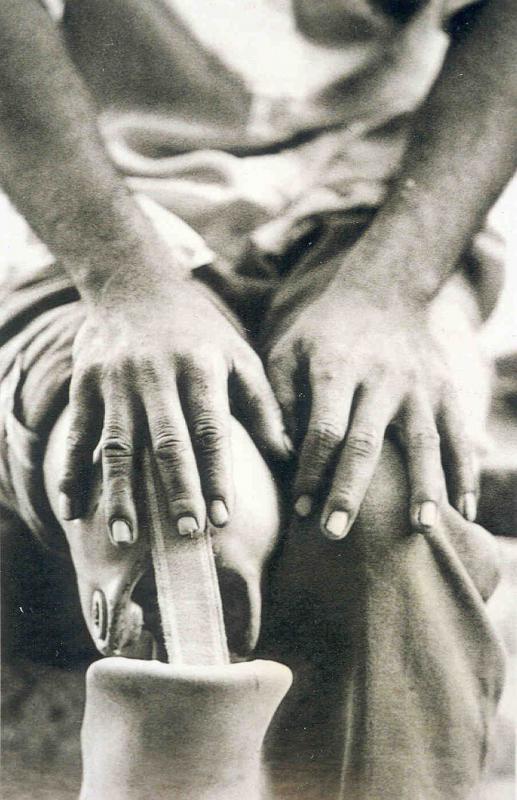
The great struggle to end anti-personnel landmines continues. Up to now, in spite of the campaign of Princess Diana, Pax Christi and a great number of Christian and to there group throughout the world, some countries continue to make landmines: Pakistan, India, USA, China. Below is an account of our Assistant Editor’s visit to Cambodia where she visited our Filipino missionaries and was faced with the stark reality of the effects of the landmines. (Ed.)
Before I went to Cambodia last year to visit our Filipino missionaries I had to finish laying out our March-April 2000 issue. I also had to edit the articles which I enjoyed doing, except for one: the articles on landmines. I quivered as I read the lines describing how landmines tore off the limbs of the victims. So I went to Cambodia not only with my unpleasant memory of the movie, The Killing Fields, but also with the uncertainty of my safety. I could step on a landmine by chance and lose my leg or... my life. Was I ready to take this risk? I had to make a decision. I decided to go.
Center of Dove
I visited our 15 Filipino missionaries in Phnom Penh. Among them was Fr. Totet Banaynal, sj from Mindanao. He joined the Jesuit Service Team in Cambodia last year after his ordination. Fr. Totet invited me to visit their technical school for people disabled by landmines, war and polio, not far from Phnom Penh, called Banteay Prieb, meaning Center of Dove. He collected me at my homebase – the Salesian Sister’s house – and off we went on his motorbike to the school. Fr. Totet told me on our way that it was in this school where my batchmate and friend in college Richie Fernando died. As we entered the gate, I felt at home knowing that Richie was once here. I went to see the Buddhist memorial, erected in his memory which enshrined his blood. For a moment I stood there in silence.
Earning and Learning in Banteay Prieb
Banteay Prieb offers various skill training such as carpentry, weaving, electronics and agriculture to these war victims and others. With their new skill students not only learn to earn a living but also enhance their sense of dignity and self-worth. Aside form skills training programs, the center also makes the Mekong wheel chair. Fr. Totet said that this wheel chair is unique because first all of its parts are locally produced and second it is assembled by the handicapped for fellow handicapped.Mekong Wheelchairs travel across the different provinces of Cambodia helping the many landmine victims.
Does God Really Exist?
I asked Fr. Totet how does he find his first assignment. “I first arrived here in 1994 for my overseas training and during this time I want though a dilemma. Everyday I saw people with one leg, malnourished children playing on the streets, young girls dragged into prostitution. Everywhere I go I see these faces. I began to ask where God is amidst all these sufferings. Why are there so many people maimed by landmines, children becoming orphans because of war and girls force into prostitution because of poverty? Does God really exist? Of course, I felt guilty with my question because I was a seminarian and had taken my vows at that. But as the days passed the question deepened. I rarely went to Mass and if did I felt empty. I was almost convinced that God did not exist.”
God Exist
During his period of dilemma Fr. Totet met Vanna – a boy with elephantiasis, a kind of leprosy in which the skin takes on the appearance of an elephants hide. Every afternoon Vanna would go to Fr. Totet to have his wounds on his leg cleaned. Fr. Totet would boil water, prepare a towel and then start cleaning Vanna’s wounds.One day while cleaning Vanna's wounds he wondered. “Why am I doing all these for Vanna?" It suddenly dawned on him that he loves Vanna that’s why he was helping him. He finally found the missing piece in his question. “If I love Vanna and if God is love, therefore God exist. He had been here all along... in this land of suffering, in the land where my bestfriend, Richie gave up his life.”
Hopeful in Cambodia
Fr. Totet sees so much capacity n the Khmer people. Despite their brokenness, they have the potential to reach out to others, talents to be tapped and skill to be developed. He senses a lot of goodness, dignity and hope. Take Vanna for example. He never forgot to say thank you with a smile to Fr. Totet. And meet Suka who lost both legs and even has missing fingers. After she finished her course at the center Suka can now sculpt and radiates with so much life. She even joined a seven-kilometer race for the handicapped on her wheelchair and won the second place.
Visit to Angkor Wat
Then I went to see Angkor Wat at Siem Reap province. I stayed at the Jesuit Refugee Service Center (JRS) where I met Totok, Fr. Widi and Kao. They showed me around the compound of the historic Angkor Wat. I was surprise at its expanse and looking at the intricate designs carved on huge stones of the temple built in 12th century was just amazing.
Sokheum’s Fate
At the JRS Center lives Sokheum Man, one of the scholars of the Jesuits. In January 10, 1996, fourteen-year-old Sokheum and his best friend Chai Chun rode their bicycle to school to study together. They knew that landmines are dangerous but Sokheum could not understand until now why his bestfriend picked up the mine – which looked like a rocket – they saw on the road. They brought it to the nearest army base. On their way the mine fell to the ground and exploded – killing Chai on the spot. The blast tore of half of Sokheum’s right foot. Sokheum endured the agony and pain for almost two weeks because he didn’t want to join the army of cripples in Cambodia. But the doctor was obliged to amputate his leg when gangrene set in.
His Life Anew
“I wanted to die when I learned that the doctor had to amputate my right leg. I didn’t want to be counted among the landmine victims. I come from a very poor family. My parents had to sell a large part of our year’s rice crop to pay for my hospital expenses.” Sokheum eventually got his prostheses (artificial leg) with the help of many organizations. He is now more than happy to have survived the accident. With his artificial leg he now lives a normal life. He plays basketball, rides a bicycle and can even plow the fields.
Keep on Dreaming
Sokheum wants to tell his fellow landmine victims not to lose hope and not to give up. To the young ones he wants them to continue studying and for the older ones to find a technical school like the ones run by the Jesuits at Banteay Srie and learn new skills. “When I lost my leg, I also lost interest in studying. But when I saw the students in Banteay Srie studying vocational curses such as electronics I was inspired to go back to school. It was difficult at first but after a while I got adjusted to my new leg.” I asked him what he would like to be when he graduates in high school. He said, “I want to be a lawyer and use my knowledge so that no more people will be harmed by landmines.” Our Filipino Jesuits are helping him to reach his dream.
The Peddler
By Fr. Rolly Aniscal ssc
I was selling fruits in a bus terminal before I knew the Columbans. Being the eldest of five, I had to help my parents in this kind of livelihood. Since seven, it had been my life. My parents were peddlers at a bus terminal and through them I learned to face one of the hard facts of life: how to live in a situation where what you earned on that day is consumed on that same day. I had no intention whatsoever of finishing college because I didn’t see any reason of doing so. What the use? Money flows in the terminal if you are industrious enough to run when the bus arrives and know how to entertain people in order to buy your fruits. Frugality then became my acquired value- save the last penny because it is not easy to get it.

He paved the way
God has his own way of directing my life. I happened to know that a particular program called the Christian Children’s Fund will help those who cannot afford to go to high school. There were thousands of us who were accepted and given the privilege to enter school free-of-charge. At that time, the RVM sisters were the ones running the program. I got a scholarship to study in there prestigious Catholic institution, Christ the King College. And it paved the way for me to discover my potential for being a leader in my community. It was also through them that I was introduced to the Columbans.
Columbans just over the fence
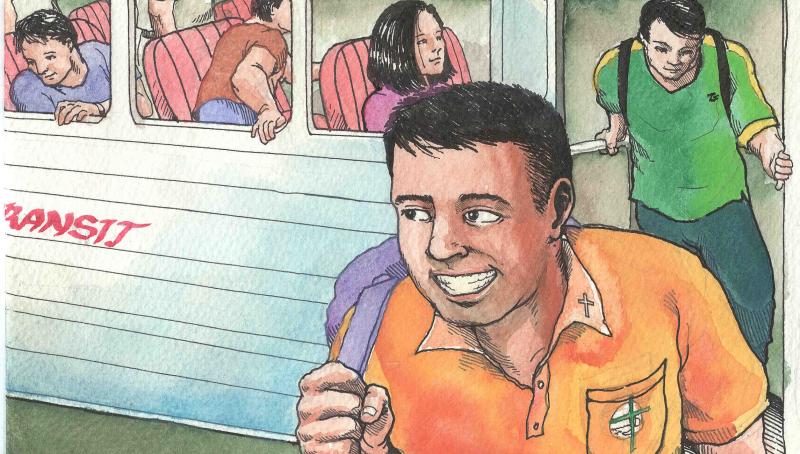
It was a clear, sunny day when a very noisy and big fellow came to our school and he was really noisy that he attracted our attention. He was Fr. Dick Pankratz. We found ourselves listening to his stories with fascination as he told stories in very festive mood. It was from him that I got to know the mission and the Columbans. In my place, we knew of some missionaries but not the Columbans. Little did I know that they have been working in our parish for many years.
A Peddler by blood
I then entered the seminary with the vision of changing my life and making some difference in the world. But it did not really erase my old ways of thinking and lifestyle. I used to always go back to the bus terminal every vacation because it is my world. Acquired knowledge in the university did not change anything in me. Friendship, trust and how to relate with people were the basic values that I learned in the bus terminal.
Missionary longing
I would say that missionary vision developed as I went through the whole program of the Columbans. My encounter with the different types of people in the society – the sane and insane, the underprivileged, the sick and the dying and the abandoned children – have helped me find my direction. Our constant contact with the Columbans abroad and those who happen to pass by the house has given me the privilege to know the life in the mission. I then started longing to go to the missions and to experience how if feels to be nobody in a foreign land.
Partaking of the Columban Experience
My missionary awareness was deepened when I was sent to Japan to do my First Missionary Experience and it was more than a privilege to partake in the experience of the Columbans in that area. I had my share of frustrations, boredom and disappointments as I struggled to learn the language (Nihongo) and the culture. Nevertheless, the more I dwelled on my frustrations, the more I sought God who does not abandon us. Indeed, the sense of joy and fulfillment cannot be denied. I am happy in the missions. There are no dull moments here. There is always something new that can ignite the spirit within. For that reason, I asked to be ordained and to go back to the missions, wherever God calls me.
God does most of the job
I am now working here in Lima Peru as a missionary priest. After my language studies in Cochabamba, Bolivia, for five months, here I am again, struggling to speak Spanish with the common tao in my parish. There is that sense of frustration because of language barrier. However, the sense of freedom and inner joy within is what I want to convey to the people, to the youth of today. We can make a difference in our very little way but God is the one who does most of the job.
I am still peddling. But not anymore fruits in the bus terminal. I am now peddling the fruit of Christ’s love and affection to me to the people, giving witness to God’s love that I experience to the Peruvian Church.
Why I Believe Life Is Good
By Bo Sanchez
There are some things in life which I deeply enjoy. Like standing on top of a serene mountain breathing in God’s beauty. Or simply reading a good fat book that I can’t put down. Or just being hugged by a little child or eating ice cream with friends. But here is this one specific thing that I do which I find exquisitely sweet. Awesome even. It probably one of the most profoundly inspiring things that I do.
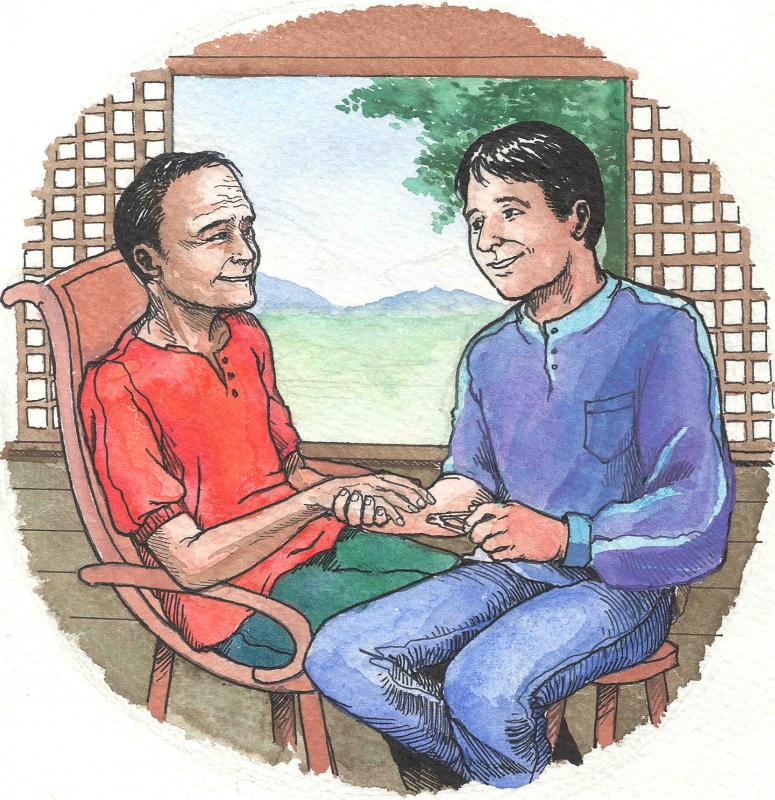
You might think it’s preaching. Or writing for Kerygma. Or leading worship. Believe me, I love doing those things but I’m thinking of something but I’m thinking of something else. (Something downright simple)
I’m thinking about cutting Dad’s fingernails. And toenails. You see, Dad is turning 80 years old. And he can’t see very well anymore. So, whenever I’m home, this elderly man lumbers towards me, and very shyly, shows me his fingernails and toenails. He doesn’t have to say anything. He just chuckles. And I understand.
So, I get my heavy-duty, industrial-strength kryptonite nail clipper. And we do to work. I also wear bullet-proof goggles to protect my eyes, lest they be injured by flying shrapnel. Beside me is a chain saw, just in case my mail clipper won’t do. But as I do my heart melts within. Because many years ago, I still remember when he’d do this for me. As a little boy, I d sit his lap, and he’d hold my tiny hands, and with great care, cut my nails. I remember him doing this again and again and again!
Those were also the days when he’d bring me to the barber shop. As I’d sit on the high chair, he’d tell the barber what to do. “Make him guwapo.” He’d command.
Today, things are a little bit different. I now bring him to the barber – after some shy signal from him that he doesn’t want to look like Freddie Aguilar. With a sheepish smile, he’d form his fingers like scissors and run them though is grayish hair. And so I’d drive him to a nearby barber shop. Trying to stop my tears from falling. And when he’d plop on the chair, I’d tell the barber what to do. “Make him guwapo like me,” I’d command.
Life is good. Why?
Because life gives me precious moments to say “thanks” to special people
Because life gives me abundant opportunities to genuinely love.
Because life gives me a way to be a better person, every day.